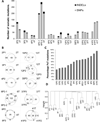Genetic alterations associated with progression from pancreatic intraepithelial neoplasia to invasive pancreatic tumor
- PMID: 23912084
- PMCID: PMC3926442
- DOI: 10.1053/j.gastro.2013.07.049
Genetic alterations associated with progression from pancreatic intraepithelial neoplasia to invasive pancreatic tumor
Abstract
Background & aims: Increasing grade of pancreatic intraepithelial neoplasia (PanIN) has been associated with progression to pancreatic ductal adenocarcinoma (PDAC). However, the mechanisms that control progression from PanINs to PDAC are not well understood. We investigated the genetic alterations involved in this process.
Methods: Genomic DNA samples from laser-capture microdissected PDACs and adjacent PanIN2 and PanIN3 lesions from 10 patients with pancreatic cancer were analyzed by exome sequencing.
Results: Similar numbers of somatic mutations were identified in PanINs and tumors, but the mutational load varied greatly among cases. Ten of the 15 isolated PanINs shared more than 50% of somatic mutations with associated tumors. Mutations common to tumors and clonally related PanIN2 and PanIN3 lesions were identified as genes that could promote carcinogenesis. KRAS and TP53 frequently were altered in PanINs and tumors, but few other recurrently modified genes were detected. Mutations in DNA damage response genes were prevalent in all samples. Genes that encode proteins involved in gap junctions, the actin cytoskeleton, the mitogen-activated protein kinase signaling pathway, axon guidance, and cell-cycle regulation were among the earliest targets of mutagenesis in PanINs that progressed to PDAC.
Conclusions: Early stage PanIN2 lesions appear to contain many of the somatic gene alterations required for PDAC development.
Keywords: AAF; ATM; LCM; P; PDAC; PanIN; Pancreas; PxT; SNV; T; Tumorigenesis; WGA; Whole-Genome Amplification; alternate allele frequency; ataxia telangiectasia mutated; laser capture microdissection; pancreatic ductal adenocarcinoma; pancreatic intraepithelial neoplasia; pancreatic intraepithelial neoplasia alone; single-nucleotide variant; tumor; tumors and adjacent pancreatic intraepithelial neoplasia; whole-genome amplification.
Copyright © 2013 AGA Institute. Published by Elsevier Inc. All rights reserved.
Conflict of interest statement
Figures


References
-
- Fitzgerald TL, Hickner ZJ, Schmitz M, Kort EJ. Changing incidence of pancreatic neoplasms: a 16-year review of statewide tumor registry. Pancreas. 37:134–138. - PubMed
-
- Cubilla AL, Fitzgerald PJ. Pancreas cancer (non-endocrine) Clin Bull. 2008;8:91–99. - PubMed
-
- Jemal A, Siegel R, Ward E, et al. Cancer statistics, 2009. CA Cancer J Clin. 2009;59:225–249. - PubMed
-
- Smeenk HG, Tran TC, Erdmann J, et al. Survival after surgical management of pancreatic adenocarcinoma: does curative and radical surgery truly exist? Langenbecks Arch Surg. 2005;390:94–103. - PubMed
-
- Sohn TA, Yeo CJ, Cameron JL, et al. Resected adenocarcinoma of the pancreas-616 patients: results, outcomes, and prognostic indicators. J Gastrointest Surg. 2000;4:567–579. - PubMed
Publication types
MeSH terms
Substances
Grants and funding
LinkOut - more resources
Full Text Sources
Other Literature Sources
Medical
Research Materials
Miscellaneous

